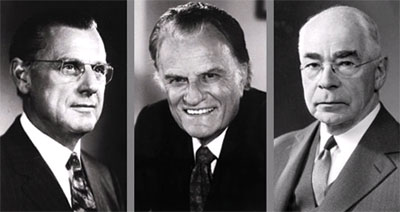 Gordon-Conwell Theological Seminary was founded in 1969 through the efforts of famed evangelist Dr. Billy Graham; Park Street Church pastor, Dr. Harold John Ockenga; and philanthropist J. Howard Pew. These men desired to establish an interdenominational, evangelical seminary dedicated to equipping students for "all facets of gospel outreach." Gordon-Conwell continues to fulfill that vision today, combining educational innovation with academic rigor and faithfulness to the Gospel.
Gordon-Conwell Theological Seminary was founded in 1969 through the efforts of famed evangelist Dr. Billy Graham; Park Street Church pastor, Dr. Harold John Ockenga; and philanthropist J. Howard Pew. These men desired to establish an interdenominational, evangelical seminary dedicated to equipping students for "all facets of gospel outreach." Gordon-Conwell continues to fulfill that vision today, combining educational innovation with academic rigor and faithfulness to the Gospel.
Gordon-Conwell also continues to need the support of faithful friends and donors as it fulfills its founders' vision, now encapsulated in our mission to train students to think theologically, engage globally and live biblically. The distinguished Founders' Society recognizes and honors these friends and donors who provide planned giving gifts in support of this ongoing mission.
We are honored to extend membership in the Founders' Society to those who make a planned gift to Gordon-Conwell in a variety of ways. Visit our Ways to Give page for specific ways you can help extend the vision of our founders and further the mission of Gordon-Conwell.
About the Founders
Rev. Dr. Harold John Ockenga was pastor of Boston's historic Park Street Church from 1916 to 1969, and was involved in nearly "every major evangelical movement of the 1940-1980 period." Rev. Bill Graham, well-known evangelist and preacher, has been a key figure in Twentieth Century Evangelicalism. Mr. J. Howard Pew, former president of the Sun Oil Company, was a prominent philanthropist. These men saw the need for a strong, evangelical seminary in the Northeast, resulting in Gordon Divinity School and the Conwell School of Theology merger in 1969. The vision for the school was to "establish within a strong evangelical framework, an independent, interdenominational seminary whose constituents are united in the belief that the Bible is the infallible, authoritative Word of God...consecrated to educating men and women in all facets of gospel outreach." This vision continues to guide Gordon-Conwell to this day.
